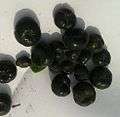Phyllanthus reticulatus
Phyllanthus reticulatus[2] is a plant species described Jean Louis Marie Poiret; it is included in the family Phyllanthaceae.[3][4]
| Phyllanthus reticulatus | |
|---|---|
 | |
| Leaves and flowers | |
 | |
| Fruit | |
| Scientific classification | |
| Kingdom: | Plantae |
| Clade: | Tracheophytes |
| Clade: | Angiosperms |
| Clade: | Eudicots |
| Clade: | Rosids |
| Order: | Malpighiales |
| Family: | Phyllanthaceae |
| Genus: | Phyllanthus |
| Species: | P. reticulatus |
| Binomial name | |
| Phyllanthus reticulatus | |
| Synonyms[1] | |
|
List
| |
This is an Asian species of Phyllanthus (but it was also introduced to Jamaica); it has been confused with P. polyspermus.[5] In Vietnamese its name is phèn đen (sometimes diệp hạ châu mạng).
Phyllanthus reticulatus is pollinated by several different species of Epicephala in East Asia. The adult moths pollinate the flowers but lay eggs in the P. reticulatus flowers' ovaries, where the emerging larvae consume some of the developing seeds.[6]
Subspecies
The following subspecies are listed in the Catalogue of Life:[3]
- Phyllanthus reticulatus var. glaber (Thwaites) Müll.Arg.
- P. r. reticulatus (see synonyms)
Description
Phyllanthus reticulatus is a shrub, sometimes partially scrambling and usually only up to 5 m high, with light reddish-brown or grey-brown with hairy stems when young, which become smooth with age. For a full description see Flora of China and the gallery below.
Gallery
.jpg)
 fruit
fruit
 bush
bush foliage
foliage


References
- The Plant List (accessed 18 April 2017)
- J.B.A.M.de Lamarck, 1804 In: Encycl. 5: 298
- Roskov Y.; Kunze T.; Orrell T.; Abucay L.; Paglinawan L.; Culham A.; Bailly N.; Kirk P.; Bourgoin T.; Baillargeon G.; Decock W.; De Wever A. (2014). Didžiulis V. (ed.). "Species 2000 & ITIS Catalogue of Life: 2014 Annual Checklist". Species 2000: Reading, UK. Retrieved 26 May 2014.
- "World Checklist of Selected Plant Families: Royal Botanic Gardens, Kew". apps.kew.org. Retrieved 2017-08-04.
- Luo, S.X., H.-J. Esser, D. Zhang, and S. S. Renner. 2011. Nuclear ITS sequences help disentangle Phyllanthus reticulatus (Phyllanthaceae), an Asian species not occurring in Africa, but introduced to Jamaica. Systematic Botany 36(1): 99-104.
- Kawakita, A.; Kato, M. 2009. "Repeated independent evolution of obligate pollination mutualism in the Phyllantheae-Epicephala association." Proceedings of the Royal Society B. 276: 417–426.

